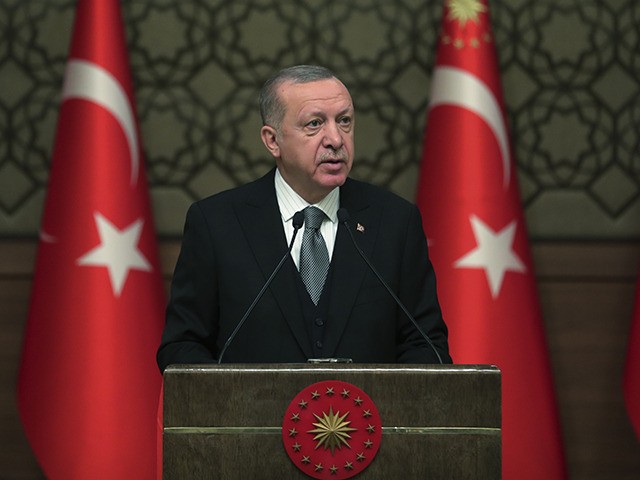A delegation of Turkish business leaders is scheduled to visit Libya within the next two weeks to evaluate Turkish business opportunities as the civil war that began with former U.S. President Barack Obama’s invasion of Libya winds down.
The Turks appear optimistic that their military intervention will defeat Gen. Khalifa Haftar and his Libyan National Army (LNA), leaving the Tripoli-based Government of National Accord (GNA) in undisputed control of most Libyan territory, especially its valuable oil resources.
Reuters noted on Wednesday that top deputies of Turkish President Recep Tayyip Erdogan have already visited GNA headquarters in Tripoli and are planning a return trip, this time with a business delegation that will discuss Turkish involvement in postwar reconstruction efforts.
Turkey already has some $16 billion in unpaid Libyan contracts, which might have been a significant factor in Erdogan’s decision to intervene on behalf of the GNA and break the LNA’s siege of Tripoli.
A Turkish official told Reuters that Turkey’s state banks will help put Libya’s banking system back together again, while providing the GNA with a system to make payments for key imports. Turkish companies that provide those imports will soon resume discussions with their Libyan counterparts that were interrupted by the coronavirus pandemic.
“As Libya lacks a strong manufacturing base, they thought these industries could be a good starting point to alleviate production issues,” Murtaza Karanfil of the Foreign Economic Relations Board of Turkey said of the Libyan and Turkish business partners.
By subscribing, you agree to our terms of use & privacy policy. You will receive email marketing messages from Breitbart News Network to the email you provide. You may unsubscribe at any time.
Arab News on Wednesday criticized Turkey for supporting Islamist extremist forces in its drive to protect Turkish investments in Libya and secure control of Libya’s oil fields. The Turks reportedly went so far as to import jihadis from Syria to reinforce the GNA, alarming other regional powers such as the United Arab Emirates, Saudi Arabia, and especially Egypt.
French President Emmanuel Macron is also profoundly displeased with Erdogan’s moves in Libya. On Tuesday, he leveled much the same allegations as the Arab powers quoted by Arab News, accusing Turkey of a “criminal” intervention that included shipping Syrian extremists to Libya.
“I think it is a historic and criminal responsibility for a country which claims to be a NATO member,” Macron said of the Turkish intervention.
For its part, Turkey has accused France of supporting “colonial rule” and “illegitimate structures” of power in Libya, charging France with covertly backing Haftar in his assault on Tripoli. France does not officially support the LNA but has called for a “political solution” to the Libyan crisis instead of military intervention.
“France has an important responsibility in dragging Libya into chaos. The people of Libya will never forget the damage France has inflicted on this country,” the Turkish Foreign Ministry said last week.
A spokesman for Turkey’s ruling AKP party upped the ante on Tuesday, calling France the “perpetrator” of crimes in Libya, including mass graves allegedly filled with corpses by Haftar’s militia allies. The Turkish party compared France’s role in Libya to the mistakes it made leading up to the 1990s genocide in Rwanda.
Turkey’s next move is expected to be a push for control of Libya’s “oil crescent,” the region that once generated most of Libya’s revenue. Egypt has declared the oil crescent off-limits and strongly hinted it will invade to block the Turks or their allies from taking control of the area.
The House of Representatives in Tobruk, the rival government that gives political support to Haftar and the LNA, has said it will ask Egypt to intervene if the key city of Sirte is attacked, and the Egyptians have said they believe they would be justified in doing so under the U.N. Charter, since Egypt’s borders would be threatened if Turkish and jihadi forces move past Sirte.
Emboldened by Turkish support, the GNA has indicated it will not consider any political solution to its conflict with the LNA until Haftar’s forces withdraw from Sirte and the strategically vital airbase at al-Jufra, the city that forms the other end of what Egypt describes as a “red line” for military intervention in Libya.

COMMENTS
Please let us know if you're having issues with commenting.